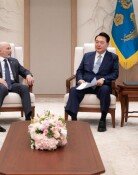Japan`s attitude change should precede tripartite summit
Japan`s attitude change should precede tripartite summit
Posted November. 15, 2014 03:20,
Northeast geopolitics surrounding the Korean Peninsula is about to face a great change. In the ASEAN+3 (South Korea, China and Japan) Summit held in Myanmar, South Korean President Park Geun-hye said, South Korea-China-Japan foreign ministerial meeting will be held in the near future. I hope to convene a summit of the three countries based on the ministerial meeting. North Korea, which was not invited to the Asia-Pacific Economic Cooperation summit (APEC) by China, will soon dispatch Choe Ryong Hae, a secretary of the ruling Workers` Party, as a special convoy of North Korean leader Kim Jong Un to Russia. The South Korean government must pro-actively exercise diplomatic maneuvers with aims to improve relationship of the three nations, which has been strained due to Japans regressive attitude against its past wrongdoings, and to ensure North Korea-Russia approach brings about peace and stabilization on the Korean Peninsula.
South Korea, China and Japan have had a summit every year since 2008 to promote regional peace and stabilization, pursue economic collaboration and strengthen responsiveness against disasters. As the Abe administration started having conflicts with South Korea and China for its territory and past wrongdoing issues, however, the annual tripartite summit has been suspended since the 5th meeting in Beijing in May 2012. The three Northeast Asian countries announced a kick-off of preparation for tripartite FTA in the last summit of 2012. Even though the three nations held negotiations five times since November the same year, they didnt reach a consensus on scale and level of the FTA. If the South Korean government, which took turns being the chair, proposes an agenda for a fast conclusion of South Korea-China-Japan FTA and takes actions accordingly, South Korea will be able to achieve utilitarian diplomacy through economic collaboration to grow a pie of three Northeast Asian countries.
Collaboration among South Korea, China and Japan is critical not just for economic development but also for resolution of North Koreas nuclear issue and realization of peace in the Korean Peninsula. North Korea is now seeking a close relationship with Russia as a way-out of diplomatic isolation. Choi Ryong Haes visit to Russia may aim to lay the foundation for North Korea-Russia summit. North Korea, which has been distant from China due to its pursuit of nuclear weapons, is approaching close to Russia. Some analysts interpret it as a message to put pressure on China. If the leaders of South Korea, China and Japan, which are members of the six-party talks, put their heads together to find a solution, such fact itself may serve as a deterrent to North Korea. Through in-depth dialogues with the U.S. and Russia, South Korea must lead the two countries to persuade North Korea.
Japan also needs to show changed attitude in dealing with comfort women issue and other past wrongdoings. Japan must acknowledge its past misdeeds and have an apologetic attitude. That will be how Japan can restore relations with South Korea and China, and open a door to the future of co-prosperity in the Northeast Asia region.







